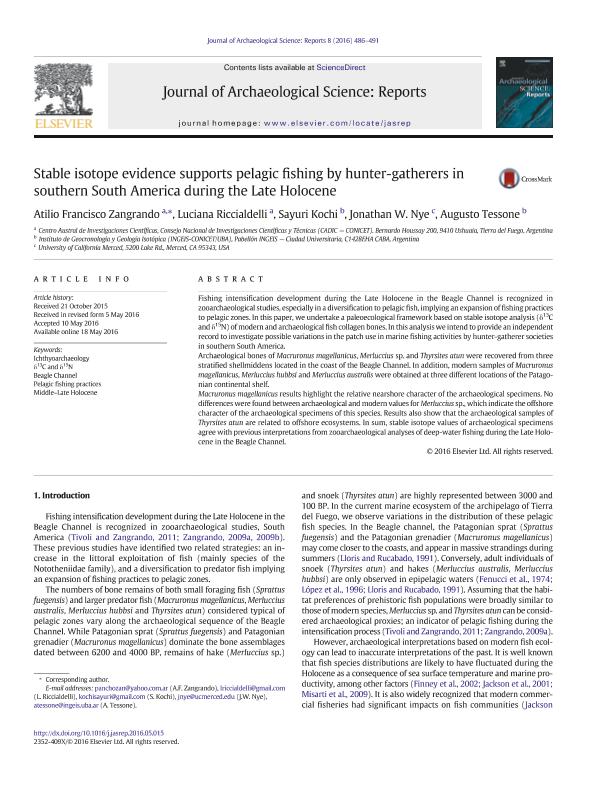Mostrar el registro sencillo del ítem
dc.contributor.author
Zangrando, Atilio Francisco Javier

dc.contributor.author
Riccialdelli, Luciana

dc.contributor.author
Kochi, Sayuri
dc.contributor.author
Nye, Jonathan W.
dc.contributor.author
Tessone, Augusto

dc.date.available
2017-07-17T16:33:23Z
dc.date.issued
2016-05
dc.identifier.citation
Zangrando, Atilio Francisco Javier; Riccialdelli, Luciana; Kochi, Sayuri; Nye, Jonathan W.; Tessone, Augusto; Stable isotope evidence supports pelagic fishing by hunter-gatherers in southern South America during the Late Holocene; Elsevier; Journal of Archaeological Science: Reports; 8; 5-2016; 486-491
dc.identifier.issn
2352-409X
dc.identifier.uri
http://hdl.handle.net/11336/20700
dc.description.abstract
Fishing intensification development during the Late Holocene in the Beagle Channel is recognized in zooarchaeological studies, especially in a diversification to pelagic fish, implying an expansion of fishing practices to pelagic zones. In this paper, we undertake a paleoecological framework based on stable isotope analysis (δ13C and δ15N) of modern and archaeological fish collagen bones. In this analysis we intend to provide an independent record to investigate possible variations in the patch use in marine fishing activities by hunter-gatherer societies in southern South America. Archaeological bones of Macruronus magellanicus, Merluccius sp. and Thyrsites atun were recovered from three stratified shellmiddens located in the coast of the Beagle Channel. In addition, modern samples of Macruronus magellanicus, Merluccius hubbsi and Merluccius australis were obtained at three different locations of the Patagonian continental shelf. Macruronus magellanicus results highlight the relative nearshore character of the archaeological specimens. No differences were found between archaeological and modern values for Merluccius sp., which indicate the offshore character of the archaeological specimens of this species. Results also show that the archaeological samples of Thyrsites atun are related to offshore ecosystems. In sum, stable isotope values of archaeological specimens agree with previous interpretations from zooarchaeological analyses of deep-water fishing during the Late Holocene in the Beagle Channel.
dc.format
application/pdf
dc.language.iso
eng
dc.publisher
Elsevier

dc.rights
info:eu-repo/semantics/openAccess
dc.rights.uri
https://creativecommons.org/licenses/by-nc-nd/2.5/ar/
dc.subject
Ichthyoarchaeology
dc.subject
Δ13c And Δ15n
dc.subject
Beagle Channel
dc.subject
Pelagic Fishing Practices
dc.subject.classification
Arqueología

dc.subject.classification
Historia y Arqueología

dc.subject.classification
HUMANIDADES

dc.title
Stable isotope evidence supports pelagic fishing by hunter-gatherers in southern South America during the Late Holocene
dc.type
info:eu-repo/semantics/article
dc.type
info:ar-repo/semantics/artículo
dc.type
info:eu-repo/semantics/publishedVersion
dc.date.updated
2017-07-13T18:31:12Z
dc.journal.volume
8
dc.journal.pagination
486-491
dc.journal.pais
Países Bajos

dc.journal.ciudad
Amsterdam
dc.description.fil
Fil: Zangrando, Atilio Francisco Javier. Consejo Nacional de Investigaciones Científicas y Técnicas. Centro Austral de Investigaciones Científicas; Argentina
dc.description.fil
Fil: Riccialdelli, Luciana. Consejo Nacional de Investigaciones Científicas y Técnicas. Centro Austral de Investigaciones Científicas; Argentina
dc.description.fil
Fil: Kochi, Sayuri. Consejo Nacional de Investigaciones Científicas y Técnicas. Oficina de Coordinación Administrativa Ciudad Universitaria. Instituto de Geocronología y Geología Isotopica. Universidad de Buenos Aires. Facultad de Ciencias Exactas y Naturales. Instituto de Geocronología y Geología Isotópica; Argentina
dc.description.fil
Fil: Nye, Jonathan W.. University of California; Estados Unidos
dc.description.fil
Fil: Tessone, Augusto. Consejo Nacional de Investigaciones Científicas y Técnicas. Oficina de Coordinación Administrativa Ciudad Universitaria. Instituto de Geocronología y Geología Isotopica. Universidad de Buenos Aires. Facultad de Ciencias Exactas y Naturales. Instituto de Geocronología y Geología Isotópica; Argentina
dc.journal.title
Journal of Archaeological Science: Reports
dc.relation.alternativeid
info:eu-repo/semantics/altIdentifier/url/http://www.sciencedirect.com/science/article/pii/S2352409X16301699
dc.relation.alternativeid
info:eu-repo/semantics/altIdentifier/doi/http://dx.doi.org/10.1016/j.jasrep.2016.05.015
Archivos asociados
